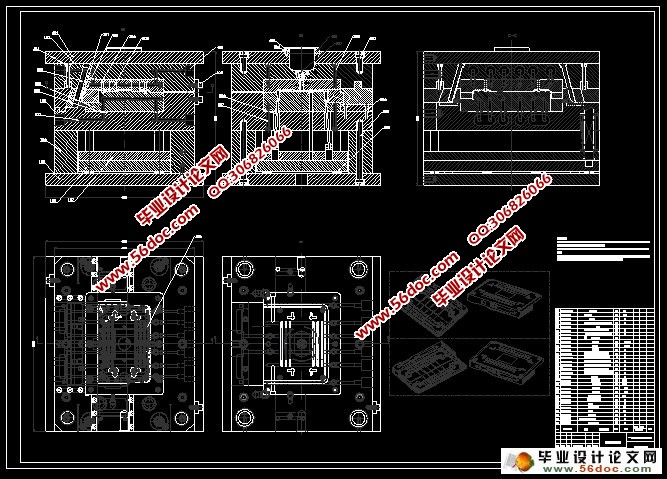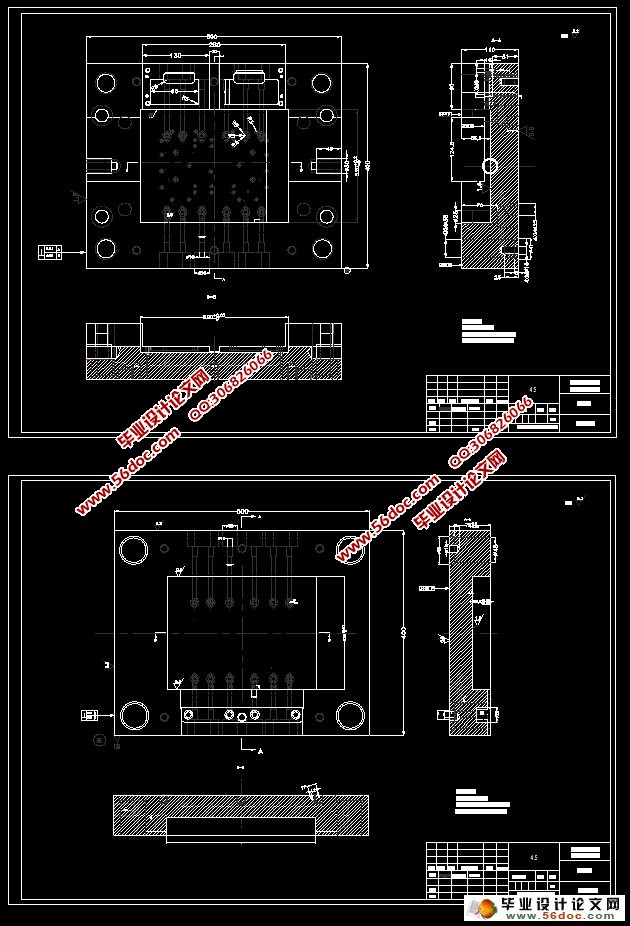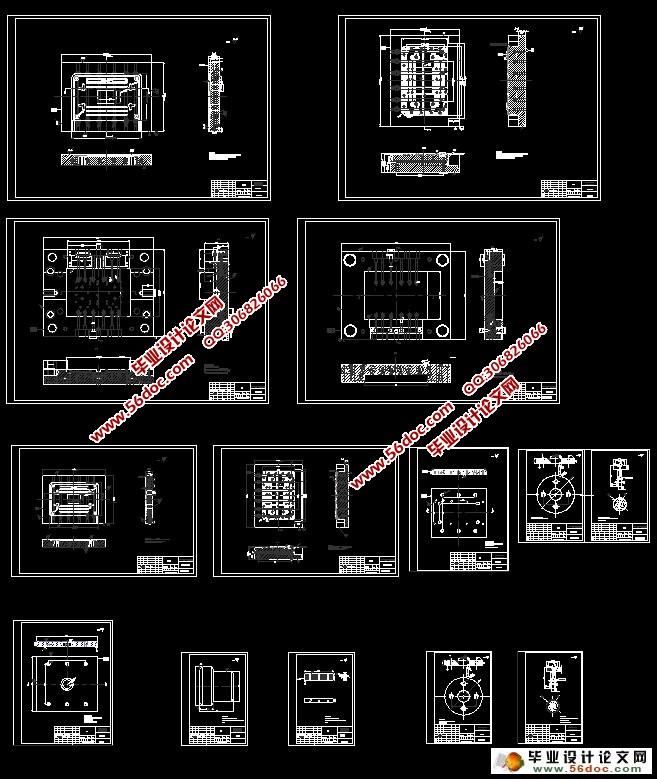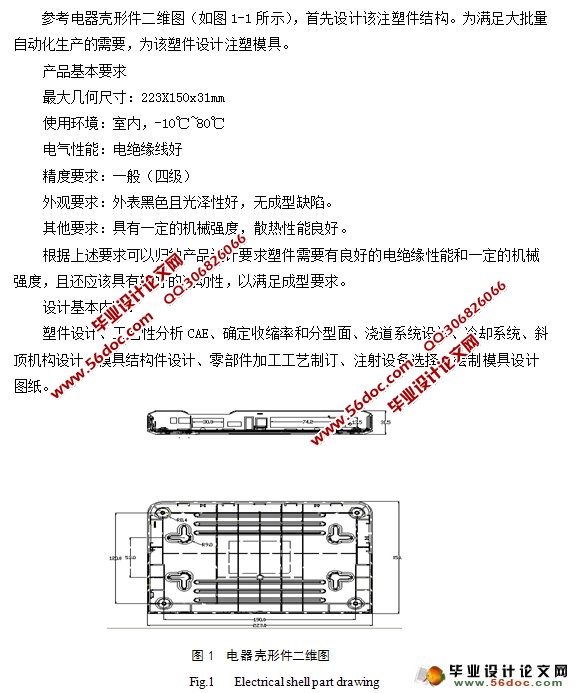塑料电器壳形件注射模具设计
无需注册登录,支付后按照提示操作即可获取该资料.
塑料电器壳形件注射模具设计(开题报告,论文设计说明书24000字,CAD图纸17张)
摘 要:通过某生产企业的实际塑胶产品,利用实体模型测量产品的尺寸,对实体进行建模,并对塑件的模具进行设计,包括塑件成品的设计、工艺参数的分析与计算、工作部分的设计、模具结构的设计和加工方案的制定,其中重点介绍了分型面的设计与斜顶机构的设计与计算,本文主要运用AutoCAD 2010及其pro/e 4.0模块来完成整个设计工作,此外还利用了Moldflow软件对塑件进行模流分析。从中学习到了许多的模具设计的知识和对在校所学知识的深化,设计的整个过程实现了无纸化,有利于提高模具的生产效率和节约了生产成本,并大大缩短了生产的周期。
关键词:注射模具;工艺;设计
Plastic Shell Injection Mold Design
Abstract: ThroPRO/E 4.0h a production enterprise of the actual plastic products, using the entity model of the size of the measurement products, the entity modeling, and the plastic parts of the mould design, including the design of the plastic parts finished product, process parameters of the analysis and calculation, the work of design, mould structure design and processing plan formulation, of which mainly introduces the design and classification of inclined top institutions design and calculation, this paper mainly use AutoCAD 2010 and pro/e 4.0 module to complete the whole design work, moreover also use the software to plastic parts for Moldflow mold flow analysis. Learn to many of the die design knowledge and to guide the deepening of knowledge, the design of the whole process realized the paperless, improve the production efficiency and save the mould of the production cost, shorten the cycle of production.
Key words :injection mould; Technology; design






目 录
摘要 ………………………………………………………………………………………1
关键词 ……………………………………………………………………………………1
1 前言……………………………………………………………………………………2
1.1 国内模具相关技术发展和现状…………………………………………………2
1.1.1 国内模具市场现状……………………………………………………2
1.1.2 国内模具的发展前景…………………………………………………3
1.2 家电产品模具在本地区的现状………………………………………………4
2 毕业设计的主要内容和目的……………………………………………………………5
2.1 毕业设计任务…………………………………………………………………5
2.2 电器壳形件模具的设计流程………………………………………………… 5
3 注射模具设计应用软件介绍以及零件建模…………………………………………6
3.1 概述……………………………………………………………………………6
3.2 模具设计环境和应用软件……………………………………………………6
3.2.1 pro/E4.0………………………………………………………………6
3.2.2 EMX 4.1………………………………………………………………8
3.2.3 其它软件AutoCAD2010………………………………………………8
3.3 零件的三维图和二维工程图建模……………………………………………8
3.3.1 零件的立体图建模……………………………………………………8
3.3.2 零件的二维工程图绘制………………………………………………9
3.4 零件的基本数据………………………………………………………………9
3.4.1 零件工艺性分析………………………………………………………9
3.4.2 零件材质………………………………………………………………9
3.4.3 零件结构分析…………………………………………………………11
3.4.4 零件体积与质量……………………………………………………12
3.5 零件图及其尺寸公差…………………………………………………………12
4 选择注射机及其相关参数的校核……………………………………………………13
4.1 确定型腔数量…………………………………………………………………13
4.2 注塑机型号的确定……………………………………………………………13
4.2.1 有关塑件的计算………………………………………………………14
4.2.2 注射机型号的确定……………………………………………………15
4.2.3 型腔数量的校核………………………………………………………15
4.2.4 注射机工艺参数的校核………………………………………………15
5 分型面及其浇注系统的设计…………………………………………………………16
5.1 分型面位置和形式的确定……………………………………………………17
5.2 主流道的设计…………………………………………………………………17
5.2.1 主流道的尺寸………………………………………………………18
5.2.2 主流道衬套的形式及其固定…………………………………………19
5.2.3 冷料井的设计…………………………………………………………21
5.2.4 浇口的设计……………………………………………………………21
6 在EMX中设计成型零、部件结构设计和计算………………………………………23
6.1 成型零件的选材………………………………………………………………23
6.2 成型零件的尺寸计算…………………………………………………………24
6.2.1 模仁的尺寸计算………………………………………………………25
6.2.2 型腔零件的尺寸计算…………………………………………………25
6.2.3 型腔零件强度、刚度的校核…………………………………………25
6.3 成型零件的创建………………………………………………………………27
7 模架的确定……………………………………………………………………………30
7.1 模架型式及规格………………………………………………………………30
7.1.1 模架概述………………………………………………………………30
7.1.2 模架的分类……………………………………………………………30
7.1.3 模架的选择…………………………………………………………30
7.2 合模力及注塑面积和型腔数的校核………………………………………33
7.3 模具与注塑机安装部分相关尺寸校核……………………………………34
8 推出机构的设计………………………………………………………………………34
8.1 斜导柱设计 ………………………………………………………………34
8.2 滑块与导滑槽的设计 ………………………………………………35
9 冷却及排气系统设计…………………………………………………………………37
9.1 排气系统的设计………………………………………………………………37
9.2 冷却装置设计…………………………………………………………………37
10 模具安装和试模………………………………………………………………………37
11 总结……………………………………………………………………………………38
参考文献 ……………………………………………………………………………39
致谢 ………………………………………………………………………………………40
附录………………………………………………………………………………………41
